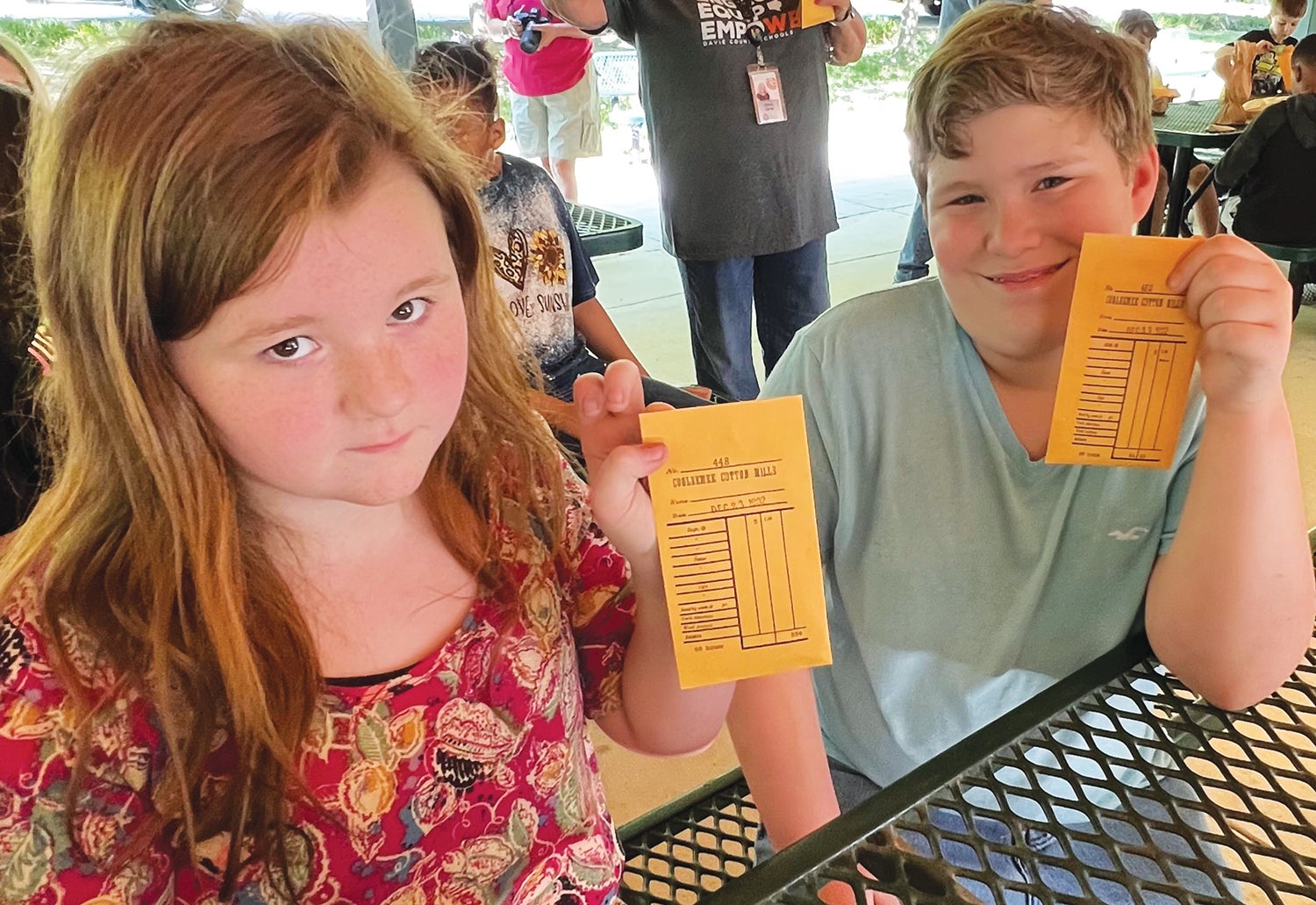A lesson in economics: Cooleemee students learn how their ancestors lived
Published 1:16 pm Tuesday, April 25, 2023

- The fourth graders not only learned that boys and girls sometimes had to work in the mill in the early 1900s, and that boys were paid considerably more. You can see on their faces how that made the students feel. - Photo by KC Smith
|
Getting your Trinity Audio player ready...
|
By KC Smith
Cooleemee Correspondent
Cooleemee Historical Association is back.
The COVID pandemic had its way in the past and not only were the members of CHA and volunteers happy to see the students again, the students themselves were so excited to be at the RiverPark at Cooleemee Falls (Bull Hole).
All fourth grade Cooleemee Elementary classes arrived two buses at a time to learn about economics of the 1700s (Native Americans), 1800s (southern back country) and 1900 (mill village) eras in Cooleemee.
Traveling leaders of the groups were John Chandler, Joey Shore and Johnathon Vizard.
The first stop was located beside the South Yadkin River where the waters were flowing over the dam and moving down to the rocks where turtles were sitting near by.
Johnny Brown and Becca Harris Hilton stood behind a table full of artifacts. Deer hides, skulls, arrowheads, turtle shells, arrows, fish and more were on display. The students had hands-on experiences looking, touching and asking questions.
They learned that the natives used animal bones, fish bones and rocks for tools and even used an empty turtle shell for bowls and drinking water. It brought wide eyes from many.
Next stop was Sandra Ferrell as Mr. Trexler who work in the grist meal. Each student took a handful of corn, gave it to Mr. Trexler and in turn was handed a small piece of cloth that contained cornmeal. Mr. Trexler was entitled to keep 15% of total amount of corn brought in.
When the large cornmeal and flour sacks were empty the cloth was used for making dresses and other useful items for the family.
The concept of bartering was played out with each student having a brown paper bag with two apples or some with peanuts. The “Nutters” and “Applegate’s” bartered with each other and learned the value of neighbors helping neighbors so they all could survive.
Building their homes required cutting down trees and with help from family and friends, they had a place to call home.
As students walked through the woods to a beautiful opening they headed to the 1900s, where “Mama” was waiting.
Donna Henderson portraying “Mama” explained that children their age and younger had to go to work in the mill because her husband died. When work day was over at the mill, girls were allowed to play with their dolls and the boys got to go swimming at the Bull Hole.
Each student received an envelope which contained their paycheck for working in the mill. When the girls compared their pay with the boys they were very unhappy. Girls received 55 cents and boys received $2.55.
“Mama” announced they had to give her all their money accept 25 cents which would allow them to go to the company store and buy a pickle, a slice of hoop cheese, a cracker and a peppermint stick.
A student shouted out he couldn’t believe he got to buy all that for just 25 cents.
Students didn’t hesitate to respond to what stood out the most of what they learned.
Molly Rae said she learned people cut down trees to make their houses, they would have help from their neighbors. They all had to work together to make something.
Emma Shadrick learned a working bull slipped in the river and drowned and that’s why that part of the river is called the Bull Hole.
Brantley Purdue knew what bartering was before but liked how thy bartered the peanuts for apples.
Ronnie Morgan said Native Americans crafted axes and tools out of rocks and bones.
Nicholas Horton really enjoyed the sounds of nature and the sound of the waterfall.
One student was upset about boys and girls doing the same job and girls making less. She said it wasn’t fair and against women’s rights.
Another student shared her thoughts about girls having to go home and take care of their siblings.
“They have to have babies and if it wasn’t for the girls the boys wouldn’t even be here,” she said.
As the buses drove away the volunteers took a break before another load arrived.
It’s a wonderful opportunity for our students to gain hands-on experience and lessons of economics that took place more than 200 years ago.
The CHA gathers volunteers to make it a success and everyone did a great job. A big thank you t to you all.
Feel free to contact me. I would love to hear from you. 336.250.1133, www.cooleemeenews@gmail.com.




